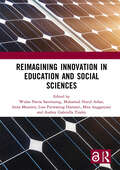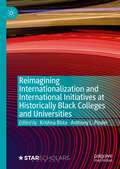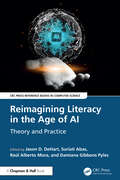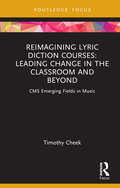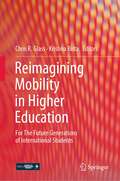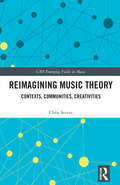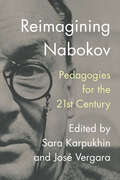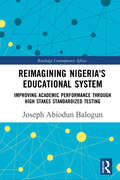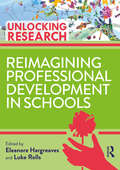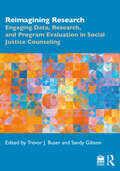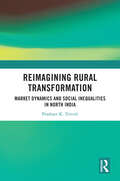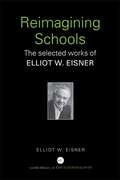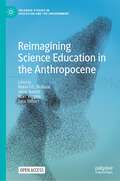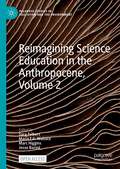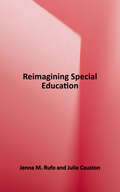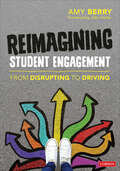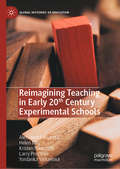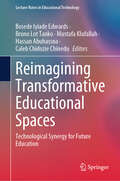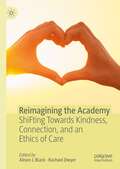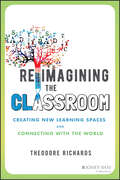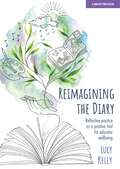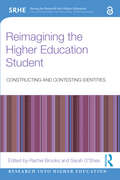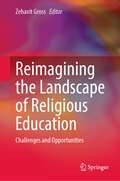- Table View
- List View
Reimagining Innovation in Education and Social Sciences: Proceedings of the International Joint Conference on Arts and Humanities (IJCAH 2022), September 10-11, 2022, Surabaya, Indonesia
by Wulan Patria Saroinsong Muhamad Nurul Ashar Irena Y. Maureen Lina Purwaning Hartanti Mita Anggaryani Audrey Gabriella TitaleyCertainly, the pandemic has affected several aspects of life. Several modifications have been made and are now continuing. The number of innovations has expanded substantially, particularly in the fields of education and social sciences. Innovations are produced by educators, scientists, and professionals. These innovations must be distributed to aid the development of society in the sphere of education and beyond. After the eradication of the disease, we shall assist one another in conquering it and then develop and prosper together. This volume contains the works of educators, researchers, practitioners, and academics presenting the most recent research results, issues, and practical difficulties and solutions found in the domains of Education, Cultural Studies, Applied Linguistics, and Community Services. Reimagining is a creative method to approach or address challenges associated with innovation in the fields of education, cultural studies, applied linguistics, community services, or social sciences. Due to the topic areas covered in this proceeding, it is appropriate for instructors, researchers, practitioners, and academics who specialize in the aforementioned subjects. The Open Access version of this book, available at http://www.taylorfrancis.com, has been made available under a Creative Commons Attribution-Non Commercial-No Derivatives (CC-BY-NC-ND) 4.0 license. Funded by Universitas Negeri Surabaya, Indonesia.
Reimagining Internationalization and International Initiatives at Historically Black Colleges and Universities
by Krishna Bista Anthony L. PinderThis book explores the internationalization policy, programs, and initiatives at Historically Black Colleges and Universities (HBCUs) in the United States. This book addresses the value and impact of internationalization for all students at HBCUs and beyond. Internationalization can be leveraged as a tool for social justice and diversity thus moving students who are often placed at the periphery of society to the center. It also highlights the tensions between internationalization and institutional policies and priorities, while still serving, who have been historically marginalized.
Reimagining Literacy in the Age of AI: Theory and Practice (CRC Press Reference Books in Computer Science)
by Raúl Alberto Mora Damiana Gibbons Pyles Jason D. DeHart Suriati AbasThis volume assesses the critical intersection of artificial intelligence (AI) and literacy education. Drawing on the concept of "living literacies," it explores the transformative potential of AI in literacy practices, offering a comprehensive narrative that bridges theoretical frameworks with practical applications.The book goes beyond the conventional understanding of AI literacy as mere technological proficiency. Instead, it positions AI as a catalyst for expansive, inclusive, and multifaceted literacy practices in the digital age. Scholars from different parts of the world examine how AI is not just changing what we read and write but how we think, create, and express ourselves in a post-human context.KEY FEATURES Explores AI literacy that encompasses critical thinking, ethical reasoning, and creative expression Offers insights into the role of educators and researchers in cultivating AI literacy among learners Discusses how creativity and identity intertwine with AI literacy Suggests practical approaches to integrating AI into classroom instruction across different age groups This timely work serves as an essential guide for educators, researchers, and learners by navigating the evolving terrain of literacy in a world increasingly augmented by AI.
Reimagining Lyric Diction Courses: CMS Emerging Fields in Music (CMS Emerging Fields in Music)
by Timothy CheekDrawing on 30 years of teaching experience, author Timothy Cheek demonstrates how a university lyric diction class—traditionally specialized and Eurocentric—can become transformative, through engaging students with other languages and cultures, and promoting diversity, equity, inclusivity, and antiracism. Raising new possibilities for traditional lyric diction pedagogy, this book explores how to provide students with experiences that speed their growth, help them to see the big picture, spark their curiosity, clarify and expand their digital resources and skills, and set them on a path of international collaboration. Arguing against compartmentalization in voice curricula, and exploring opportunities for creativity, the author provides a guide to new approaches that will aid schools’ decisions about diction curricula in the challenging but promising era of 21st-century pedagogy. Voice faculty, diction instructors, curriculum committees, graduate students in related fields, and music school administrators should all find this book insightful and thought-provoking as it goes to the heart of issues critical to the long-term development of today’s voice students.
Reimagining Mobility in Higher Education: For The Future Generations of International Students
by Krishna Bista Chris R. GlassThis book explores emerging populations of mobile international students in order to consider innovative and inclusive approaches for a more equitable and socially just higher education for new generations of international students. It offers critical reflections on the intersections of race, place, and space at universities hosting international students across multiple geographic and cultural contexts. The volume is designed to catalyze debate on how international student learning and exchange needs to be reimagined for new generations of students in a world of increasing complexity and virtual mobility. International student mobility in higher education is intended to serve as an educational experience that speaks to the need for more interculturally sensitive and globally competent learners. However, internationalization practices like study abroad have increasingly been influenced by neoliberalism, and dynamics of commodification and consumerism, emphasizing the private benefits of such experiences in terms of the social and economic benefits to individual participants. This raises the question of inequality in such internationalization practices; who is benefitting from it? As post-secondary institutions around the world become more and more internationalized, what are the undesirable effects of these developments? Given the rapid expansion of research on both internationalization and inequality in higher education, it is foreseeable that this book will become a much-referenced text within the field and profession.
Reimagining Music Theory: Contexts, Communities, Creativities (CMS Emerging Fields in Music)
by Chris StoverReimagining Music Theory: Contexts, Communities, Creativities invites instructors to rethink how we teach music theory, challenging the traditional, classical canon-based pedagogy and offering new and alternative approaches.The study and teaching of music theory are at a crucial and invigorating crossroads, as conversations are being held about contesting canons, transforming pedagogical practices, and finding meaningful ways to make the field inclusive and diverse in repertoire, methods, and student experiences. This book aims to reimagine music theory as an explicitly and radically dialogic, creative, nimble transdisciplinary space where thinking and acting can be both deep and broad, where pluralities of knowledge systems and ways of doing and being can interact and mutually inform one another, and where teachers learn from students as much as the other way around. Rethinking what counts as music fundamentals, opening music theory to a plurality of global practices, and considering music theory as a creative and community practice are all addressed.Incorporating interviews with scholar-teachers at the forefront of innovative music theory pedagogy throughout, the book offers music theory professors and instructors frameworks for enacting meaningful change in the music theory classroom.
Reimagining Nabokov: Pedagogies for the 21st Century
by José Vergara Sara KarpukhinIn Reimagining Nabokov: Pedagogies for the 21st Century, eleven teachers of Vladimir Nabokov describe how and why they teach this notoriously difficult, even problematic, writer to the next generations of students. Contributors offer fresh perspectives and embrace emergent pedagogical methods, detailing how developments in technology, translation and archival studies, and new interpretative models have helped them to address urgent questions of power, authority, and identity. Practical and insightful, this volume features exciting methods through which to reimagine the literature classroom as one of shared agency between students, instructors, and the authors they read together. “It is both timely and refreshing to have an influx of teacher-scholars who engage Nabokov from a variety of perspectives… this volume does justice to the breadth of Nabokov’s literary achievements, and it does so with both pedagogical creativity and scholarly integrity” • Dana Dragunoiu, Carleton University "[A] valuable study for any reader, teacher, scholar, or student of Nabokov. Amongst specific and urgent insights on the potential for digital methods, the relevance of Nabokov for students today, and how to reconcile issues of identity with an author who disavowed history and politics, are much wider and timeless questions of authorial control and the ability to access reality."—Anoushka Alexander-Rose, Nabokov Online Journal Contributions by Galya Diment, Tim Harte, Robyn Jensen, Sara Karpukhin, Yuri Leving, Roman Utkin, José Vergara, Meghan Vicks, Olga Voronina, Lisa Ryoko Wakamiya, and Matthew Walker.
Reimagining Nigeria's Educational System: Improving Academic Performance Through High Stakes Standardized Testing (Routledge Contemporary Africa)
by Joseph A. BalogunThis book assesses the challenges within the Nigerian educational system and provides a concrete plan to revitalize the low-performing system by strengthening high-stakes testing at all levels. In Nigeria, many citizens believe that the solution to the country’s low performance in education is to eliminate high-stakes standardized testing. High-stakes testing refers to applying standardized student achievement tests as a primary mechanism to evaluate students, teachers, and their school’s performance. This book argues that the poor quality of education and low ranking of Nigeria’s educational system is not related to the negative consequences of high-stakes testing, but rather is due to many intrinsic factors. By conducting a comparative analysis of six high-performing education systems worldwide, the book offers a comparative summative evaluation of the educational system and offers recommendations. This book will be of interest to policymakers and scholars in the fields of African education, higher education, quality and global studies, African studies, management and administration, leadership, and professional development studies. Joseph Abiodun Balogun is former Dean and retired Distinguished University Professor at the College of Health Sciences, Chicago State University, USA, Visiting Professor/Program Consultant at the Centre of Excellence in Reproductive Health Innovation, University of Benin, Nigeria, and President/ CEO, Joseph Rehabilitation Center, Tinley Park, Illinois, USA.
Reimagining Professional Development in Schools (Unlocking Research)
by Eleanore HargreavesThis fascinating and vital book seeks to challenge the effectiveness of current practices in professional development by urging educators to rethink professional learning for teachers and teaching assistants. It importantly brings together ideas about teacher professionalism and how to build creative and trusting cultures in which high expectations are not compromised. Throughout, teachers describe significant professional learning and growth, often through dynamic partnerships with others, that allows them to inspire imaginative possibilities; different and creative ways to ignite hope and opportunity for children. Four key themes guide the reader through the collection of chapters: professional capital, learning communities, teachers as researchers and subject-specific professional development. They explore: The types of professional development approaches that support teachers to make meaningful changes within their practices. The conditions and school cultures that are needed for teachers to meaningfully prosper from professional development. The impact that unintended consequences of system accountability drivers and funding have on teachers’ experiences of professional development. The ways in which the development of curriculum and pedagogy can be integrated with models of professional development, particular in the creative arts. Packed with innovative ideas and practical suggestions and co-written by researchers and practitioners, this book highlights the importance of using research evidence to develop teachers’ practice within the realities of their own classrooms and schools. This will be a key read for teachers, school leaders, teaching assistants and student teachers.
Reimagining Research: Engaging Data, Research, and Program Evaluation in Social Justice Counseling
by Trevor J. Buser Sandy GibsonReimagining Research centers antiracist research practices and showcases real-world research in counseling practice. The book focuses on the research competencies that matter most to counselors, with each chapter co-authored by practicing counselors and counselor educators. Each chapter reflects diversity in authorship and opens with a "potential for practice" case study that illustrates a research-related challenge in the practice of counseling. Online resources—including a focus group interview, sample transcripts of qualitative interviews, video demonstrations of statistical techniques, and other documents used in research processes—present these "potentials for practice" in experiential ways. Chapters close with attention to resources that are readily available for counselors who want to implement these practices, such as evidence-based practice guidelines, open-access journals, and open-access statistical tools.
Reimagining Rural Transformation: Market Dynamics and Social Inequalities in North India
by Prashant K TrivediThis book examines the effects of the pattern of growing integration between the rural and urban economies in India. Drawing on in-depth surveys conducted in villages in north India, it examines the rural agricultural economy's transformation, productivity, technology deployment, and social relations over a period of seven years. The book focuses on the socially embedded nature of the dynamics of transformation, weaving analysis around the axis of land, caste, and gender. It also identifies policy gaps and recommends steps for a sustainable and inclusive rural transformation in the Global South.An important contribution to the study of India’s economic and social landscape, this book will be useful for scholars of agriculture, sociology, economics, political science, development studies, and South Asian studies. It will also be of interest to policymakers and journalists interested in rural development, migration, employment, agriculture, and demography.
Reimagining Schools: The Selected Works of Elliot W. Eisner
by Elliot W. EisnerElliot Eisner has spent the last forty years researching, thinking and writing about some of the enduring issues in arts education, curriculum studies and qualitative research. He has compiled a career-long collection of his finest work including extracts from books, key articles, salient research findings and major theoretical contributions and brought them together in a single volume. Starting with a specially written introduction, which gives an overview of Eisner’s career and contextualises his selection, the chapters cover a wide range of issues including: * children and art* the use of educational connoisseurship* aesthetic modes of knowing* absolutism and relativism in curriculum theory* education reform and the ecology of schooling* the future of education research.
Reimagining Science Education in the Anthropocene (Palgrave Studies in Education and the Environment)
by Jesse Bazzul Marc Higgins Maria F. G. Wallace Sara TolbertThis open access edited volume invites transdisciplinary scholars to re-vision science education in the era of the Anthropocene. The collection assembles the works of educators from many walks of life and areas of practice together to help reorient science education toward the problems and peculiarities associated with the geologic times many call the Anthropocene. It has become evident that science education—the way it is currently institutionalized in various forms of school science, government policy, classroom practice, educational research, and public/private research laboratories—is ill-equipped and ill-conceived to deal with the expansive and urgent contexts of the Anthropocene. Paying homage to myopic knowledge systems, rigid state education directives, and academic-professional communities intent on reproducing the same practices, knowledges, and relationships that have endangered our shared world and shared presents/presence is misdirected. This volume brings together diverse scholars to reimagine the field in times of precarity.
Reimagining Science Education in the Anthropocene, Volume 2 (Palgrave Studies in Education and the Environment)
by Jesse Bazzul Marc Higgins Maria F. G. Wallace Sara TolbertThis volume, a follow up to Reimagining Science Education in the Anthropocene (2021), continues a transdisciplinary conversation around reconceptualizing science education in the era of the Anthropocene. Drawing educators from many walks of life and areas of practice together in a creative work that helps reorient science education toward the problems and peculiarities associated with this contemporary geologic time. This work continues the mission of transforming the ways communities inherit science and technology education: its knowledges, practices, policies, and ways-of-living-with-Nature. Our understanding of the Anthropocene is necessarily open and pluralistic, as different beings on our planet experience this time of crisis in different ways. This second volume continues to nurture productive relationships between science education and fields such as science studies, environmental studies, philosophy, the natural sciences, Indigenous studies, and critical theory in order to provoke a science education that actively seeks to remake our shared ecological and social spaces in the coming decades and centuries. This is an open access book.
Reimagining Special Education: Using Inclusion as a Framework to Build Equity and Support all Students
by Jenna Mancini Rufo Julie CaustonAs schools reopen their doors and students return to the classroom, what will the “new normal” of special education look like? The pandemic exposed educational inequities and areas of urgent need—and now, schools have a unique opportunity to press pause and reimagine their practices. This book helps K–12 school leaders and educators take the lessons of the COVID-19 era and turn them into action: by closely examining what worked during distance learning, letting go of practices that keep some students struggling, and planning new routines and environments that meet the needs of every learner. <p><p>A visionary call to action from inclusion experts Jenna Mancini Rufo and Julie Causton, Reimagining Special Education guides readers in creating more equitable schools and services, through practical strategies teachers can use right away and thought-provoking, big-picture questions for administrators to tackle. Readers will explore how inclusive educational practices can address each student’s unique needs as schools reopen and bridge learning gaps for students who struggle. Throughout the book, vignettes and anecdotes spark lightbulb moments for educators and show what recommended practices look like in real classrooms. <p><p>Essential reading for administrators, classroom teachers, and other education professionals, this is the forward-thinking guide every school needs to reimagine the possibilities for special education, support authentic inclusion, and help learners with and without disabilities thrive in a changing world.
Reimagining Student Engagement: From Disrupting to Driving
by Amy Elizabeth BerryEngage students as true partners in learning Instead of disruptions, avoidance, and withdrawal, your learners could be participating, investing, and driving their learning experience. It’s time to reimagine student engagement! Focused around three essential goals, Reimagining Student Engagement develops a new vocabulary for real classrooms, proposes an engagement model positioning students as active partners in the learning process, and embeds the concept of engagement into the teaching and learning process. Inside you’ll find: Reflection prompts that connect ideas to experiences Vignettes illustrating common conceptions of engagement as well as challenges Case studies showcasing real teachers using engagement strategies with learners Practical classroom strategies and tips for application When you reimagine student engagement, you’ll see your students as true agents of their own learning and provide them with the motivational resources that fuel collaboration and school success.
Reimagining Student Engagement: From Disrupting to Driving
by Amy Elizabeth BerryEngage students as true partners in learning Instead of disruptions, avoidance, and withdrawal, your learners could be participating, investing, and driving their learning experience. It’s time to reimagine student engagement! Focused around three essential goals, Reimagining Student Engagement develops a new vocabulary for real classrooms, proposes an engagement model positioning students as active partners in the learning process, and embeds the concept of engagement into the teaching and learning process. Inside you’ll find: Reflection prompts that connect ideas to experiences Vignettes illustrating common conceptions of engagement as well as challenges Case studies showcasing real teachers using engagement strategies with learners Practical classroom strategies and tips for application When you reimagine student engagement, you’ll see your students as true agents of their own learning and provide them with the motivational resources that fuel collaboration and school success.
Reimagining Teaching in Early 20th Century Experimental Schools (Global Histories of Education)
by Larry Prochner Kristen Nawrotzki Helen May Yordanka Valkanova Alessandra Arce HaiThis book considers the diffusion and transfer of educational ideas through local and transcontinental networks within and across five socio-political spaces. The authors examine the social, political, and historical preconditions for the transfer of “new education” theory and practices in each period, place, and school, along with the networks of ideas and experts that supported this. The authors use historical methods to examine the schools and to pursue the story of the circulation of new ideas in education. In particular, chapters investigate how educational ideas develop within contexts, travel across boundaries, and are adapted in new contexts.
Reimagining Transformative Educational Spaces: Technological Synergy for Future Education (Lecture Notes in Educational Technology)
by Bosede Iyiade Edwards Bruno Lot Tanko Mustafa Klufallah Hassan Abuhassna Caleb Chidozie ChineduThis book explores the symbiotic relationship between human learning and machine learning, examining how emerging technologies and human–machine interfaces are reshaping the educational landscape. Organized into four sections with 20 chapters, it provides a multidisciplinary perspective on the dynamic intersection of these twin concepts. Bridging theory and practical implementation, the book goes beyond theoretical foundations, offering actionable strategies for educators, policymakers, and institutions to harness the transformative power of technology enhanced learning. This book showcases the impact of these innovations on human learning and machine learning, which is particularly relevant for developing and transition nations. Enriched with case studies, empirical research, and data-driven insights, it serves as a comprehensive guide for understanding and navigating the evolving landscape where human learning and machine learning converge.
Reimagining the Academy: ShiFting Towards Kindness, Connection, and an Ethics of Care
by Rachael Dwyer Alison L BlackThis book explores the capacities and desires of academic women to reimagine and transform academic cultures. Embracing and championing feminist scholarship, the research presented by the authors in this collection holds space for a different way of being in academia and shifts the conversation toward a future that is hopeful, kind and inclusive. Through exploring lived experiences, building caring communities and enacting an ethics of care, the authors are reimagining the academy’s focus and purpose. The autoethnographic and arts-based research approaches employed throughout the book provide evocative conceptual content, which responds to the symbolic nature of transformation in the academy. This innovative volume will be of interest and value to feminist scholars, as well as those interested in disrupting and rejecting patriarchal academic structures.
Reimagining the Classroom: Creating New Learning Spaces and Connecting with the World
by Theodore RichardsA practical approach to shared inquiry and exploration in K-12 classrooms We are in a period of unknowns unlike any in a generation or more. As educators, we need new pathways and ideas that can help us educate children for the world to come. Reimagining the Classroom: Creating New Learning Spaces and Connecting with the World provides practical steps and examples that parents and educators can use to begin to create new learning spaces, approaches, and outcomes. Dr. Richards’ provocative book asks us to reconsider some of our basic assumptions about teaching and learning. It helps parents and educators question and recast these assumptions and practices while providing concrete, tested activities and ideas that will help readers reimagine educational spaces rooted in the notion that classrooms—and the stories we tell in them—are a metaphor for the world we hope to create. Reimagining the Classroom is divided into two parts. The first offers the intellectual framework parents and educators are seeking; it identifies specific problems with current approaches, offers an alternative vision and set of narratives, and then offers a new pedagogy to satisfy this vision. The second part of the book moves from the theoretical to the practical. Dr. Richards provides tested pedagogical tools for classrooms in science and math; literature and fine arts; spirituality and mindfulness; practical arts; and justice and social-emotional learning. Discover practical tools for creating educational spaces that prepare students for the world they will encounter Help students express their values and learn to live in community Replace or supplement school with at-home learning and activities that will give students an edge for the future Learn how the traditional approach to education is failing our kids and leading to an epidemic of depression and anxiety For educators and parents ready to consider a radical shift in service of our children’s wellbeing, this book explains what, fundamentally, education can and should look like.
Reimagining the Diary: Reflective practice as a positive tool for educator wellbeing
by Lucy KellyIf you're in education, then you know that while there are many positives to the profession, it is also facing many challenges. This easy-to-use, accessible, and entertaining book shows us how diary-keeping can help us gain insight into our wellbeing needs and move forward in our lives, personally and professionally. This book is the perfect starting point to explore what reflective practice means to you. From an overview of diary-keeping and why it's important for educator wellbeing, to plenty of practical tips, strategies, and activities for you to try out yourself, it is filled with simple pragmatic guidance to help make diary-keeping a sustainable part of your practice.Reimagining the diary - to include writing, drawing, audio recordings, photographs, scrapbooking, and other approaches - is not only fun and creative, but essential when it comes to understanding yourself and your own complex needs. By adopting small changes in a way that suits you, you can start to address your individual wellbeing needs and rebalance your work and, more importantly, your life.
Reimagining the Diary: Reflective practice as a positive tool for educator wellbeing
by Lucy KellyIf you're in education, then you know that while there are many positives to the profession, it is also facing many challenges. This easy-to-use, accessible, and entertaining book shows us how diary-keeping can help us gain insight into our wellbeing needs and move forward in our lives, personally and professionally. This book is the perfect starting point to explore what reflective practice means to you. From an overview of diary-keeping and why it's important for educator wellbeing, to plenty of practical tips, strategies, and activities for you to try out yourself, it is filled with simple pragmatic guidance to help make diary-keeping a sustainable part of your practice.Reimagining the diary - to include writing, drawing, audio recordings, photographs, scrapbooking, and other approaches - is not only fun and creative, but essential when it comes to understanding yourself and your own complex needs. By adopting small changes in a way that suits you, you can start to address your individual wellbeing needs and rebalance your work and, more importantly, your life.
Reimagining the Higher Education Student: Constructing and Contesting Identities (Research into Higher Education)
by Rachel Brooks Sarah O’SheaDrawing on the perspectives of scholars and researchers from around the world, this book challenges dominant constructions of higher education students. Given the increasing number and diversity of such students, the book offers a timely discussion of the implicit and sometimes subtle ways that they are characterised or defined. Topics vary from the ways that curriculum designers ‘imagine’ learners, the complex and evolving nature of student identity work, through to newspaper and TV representations of university attendees. Reimagining the Higher Education Student seeks to question the accepted or unquestioned nature of ‘being a student’ and instead foreground the contradictions and ‘messiness’ of such ideation. Offering timely insights into the nature of the student experience and providing an understanding of what students may desire from their Higher Education participation, this book covers a range of issues, including: Impressions versus the reality of being a Higher Education student Portrayals of students in various media including newspapers, TV shows and online Generational perspectives on students, and students as family members It is a valuable resource for academics and students both researching and working in higher education, especially those with a focus on identities, their importance and their constructions.
Reimagining the Landscape of Religious Education: Challenges and Opportunities
by Zehavit GrossThis book brings together new thinking and research on religious education’s complex and evolving role in the multicultural, diverse postmodern era. It facilitates new realism and understanding of the current situation from empirical and reflective accounts relating to a variety of countries and political contexts, as well as providing innovative methodological approaches to the study of education and religion.In different contexts around the world, at different levels of education, and from different theoretical lenses, religious education occupies a contested space. The ongoing, changing nature of the world due to increasing secularization, rapid technological change, mass immigration, globalization processes, conflict and challenging security issues, from inter to intra state levels, and with shifting geopolitical power balances, generates the need to reconceptualize where religious education is positioned. It claims that religious education on its own can be an agent of moral, social and spiritual transformation are disputed. There is significant controversy about whether special religious education, that is in-faith education, still has a role within the post-modern world.
